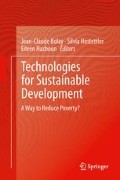Abstract
The dissemination of improved stoves can play a key role in providing poor people with an adequate energy access in contexts where biomass is the only available energy source. Burning solid fuels through inefficient and smoky stoves results in a number of negative impacts on both the users’ health and budget, and the local environment. Thus, there is an urgent need for appropriate cooking technologies that use biomass in a more efficient, cleaner and easier way. This paper presents an experience in the Logone Valley (Chad, Cameroon) where models of improved stove were disseminated. The project was led by the Italian non-governmental organization ACRA—Cooperazione Rurale in Africa e America Latina (Rural Cooperation in Africa and Latin America). The activities focused on the reduction of wood consumption and the creation of income generating activities. Stove models to be promoted were chosen according to local constraints. A rigorous methodology was applied to assess the technical performance of different models that used various fuels, and were compared with traditional cooking systems. The Centrafricain stove was chosen because of the good performance in terms of fuel savings but also because of its adaptability to the local conditions. Sale rates and acceptability by the users were assessed through specific surveys addressed to the artisans trained in the stove production and to the households that adopted the improved model. The development of a self-sustainable market, subsidized by the project only in the start-up phase and the users’ satisfaction prove the validity and the appropriateness of the adopted approach in the introduction of a new cooking technology.
Access this chapter
Tax calculation will be finalised at checkout
Purchases are for personal use only
Notes
- 1.
Total sum is more than 100 % because 9 % of the interviewed used more than one cooking device.
- 2.
Thirteen percent as the difference between LPG users before (18 %) and after (5 %) the adoption of the Centrafricain ICS.
References
Agence pour l’Energie Domestique et l’Environnement (AEDE). République du Tchad. (2002). Plan Directeur D’approvisionnement en énergie domestique de N’Djamena. Ministère de l’Environnement et de l’Eau, 2002. Retrieved Feb 16, 2012, from http://www.hedon.info/docs/rapport-pda-small.pdf
Bailis, R., Ogle, D., MacCarty, N., & Still, D. (2007). The Water Boiling Test (WBT). The household energy and health programme. Shell Foundation. Retrieved July 16, 2011, from http://ehs.sph.berkeley.edu/hem/
Barnes, D. F., & O’Sullivan, K. (2007). Energy policies and multitopic household surveys: Guidelines for questionnaire design in living standards measurement studies. World Bank Working Papers 90.
Bruce, N. G., Jagoe, K., & Bromley, H. (2007). Standard monitoring packages for household energy and health field projects. Liverpool University. Final report. Jan 2007.
Collivignarelli, C., Mazzù, A., Vaccari, M., & Vitali, F. (2010). Comparison of biomass stoves as appropriate technologies for household energy in developing countries. Proceedings Venice 2010, Third International Symposium on Energy from Biomass and Waste, Venice, Italy, 8–11 Nov 2010.
HELIO International. (2009). Energy systems: Vulnerability—adaptation—resilience (VAR) regional focus: Sub-saharan Africa Cameroon. Retrived Feb 16, 2012, from http://www.helio-international.org/uploads/VARCameroun.En.pdf
International Energy Agency (IEA). (2011). Energy poverty. How to make modern energy access universal? Special Early Excerpt of the World Energy Outlook 2010 for the UN General Assembly on the Millennium Development Goals. Retrieved Feb 16, 2012, from https://www.iea.org/publications/freepublications/publication/weo2010_poverty.pdf
IEA. (2008). World energy outlook 2008. Retrieved Feb 16, 2012, from http://www.worldenergyoutlook.org/media/weowebsite/2008-1994/weo2008.pdf
Jetter, J. J., & Kariher, P. (2009). Solid-fuel household cook stoves: Characterization of performance and emissions. Biomass and Bioenergy, 33(2), 294–305.
MacCarthy, N., Still, D., & Ogle, D. (2010). Fuel use and emissions performance of fifty cooking stoves in the laboratory and related benchmark of performance. Energy for Sustainable Development, 14(3), 161–171.
Naeher, L. P., Brauer, M., Lipsett, M., Zelikoff, J. T., Simpson, C. D., Koenig, J. Q., et al. (2007). Woodsmoke health effects: A review. Inhalation Toxicology, 19, 67–106. doi:10.1080/08958370600985875
Partnership for Clean Indoor Air (PCIA). (2010). Stove performance testing protocols. Retrieved July 25, 2011, from http://www.pciaonline.org/
Rehfuess, E. A., Bruce, N. G., & Smith, K. R. (2011). Solid fuel use: Health effect. In J. O. Nriagu (Ed.), Encyclopedia of environmental health, 5, 150–161.
UNFCCC. (2011). AMS-II.G.: Energy efficiency measures in thermal applications of non-renewable biomass. Version 3.0. Retrieved February 16, 2012, from http://cdm.unfccc.int/methodologies/
University of California–Berkeley. (2004). Stove performance testing protocols. Shell Foundation Household Energy and Health Projects.
Volunteers In Technical Assistance (VITA). (1987). Testing the efficiency of wood-burning cookstoves: Provisional international standards. ISBN: 0-86619-229-8, 76.
Vaccari, M., Vitali, F., & Mazzù, A. (2012). Improved cook stove as an appropriate technology for the Logone Valley (Chad—Cameroon): Analysis of fuel and cost savings. Renewable Energy, 47, 45–54.
Vitali, F. (2012). Appropriate solutions for cooking energy at household level in the Logone Valley (Chad—Cameroon). PhD Thesis in “Appropriate methodologies and techniques for international development co-operation” at CeTAmb Research Centre, Faculty of Engineering, University of Brescia. Supervisors: Mazzù, A., & Vaccari, M.
WHO. (2010). WHO guidelines for indoor air quality: Selected pollutants. Bonn: The WHO European Centre for Environment and Health.
WHO. (2008). Evaluating household energy and health interventions: A catalogue of methods. Geneva, Switzerland. ISBN: 978 92 4 159691 6.
Acknowledgments
Francesco Vitali conducted this research within the PhD course in “Appropriate Methodologies and Techniques for International Development Co-operation” of the University of Brescia, supported by the Alberto Archetti Fund.
Author information
Authors and Affiliations
Corresponding author
Editor information
Editors and Affiliations
Rights and permissions
Copyright information
© 2014 Springer International Publishing Switzerland
About this paper
Cite this paper
Vitali, F., Vaccari, M. (2014). Appropriate Technology for Household Energy Access: The Case of the Centrafricain Stove in the Logone Valley (Chad, Cameroon). In: Bolay, JC., Hostettler, S., Hazboun, E. (eds) Technologies for Sustainable Development. Springer, Cham. https://doi.org/10.1007/978-3-319-00639-0_11
Download citation
DOI: https://doi.org/10.1007/978-3-319-00639-0_11
Published:
Publisher Name: Springer, Cham
Print ISBN: 978-3-319-00638-3
Online ISBN: 978-3-319-00639-0
eBook Packages: Earth and Environmental ScienceEarth and Environmental Science (R0)

